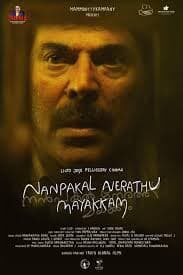One-line review: A siesta awakens many.
What’s remarkable about auteur Malayalam director Lijo Jose Pilassery’s film about an afternoon nap gone wrong is that it feels like a nap with its pacing, cinematography, and music. Despite the high drama, the notes stay within the nap “meter.”
The film is about a group of theater actors returning home to Kerala after a pilgrimage to the famous Velankanni church. Their leader and accountant, James (Mammootty), is a grumpy, penny-pinching atheist traveling with his much younger wife, Sally, and son. The group does not like his high-handedness, but they respect him. The director and writer brilliantly establish James and Sally’s loving marriage upfront without many words: he chides her but massages her feet; she constantly asks him to ramp down his irritability and sleeps fitfully in his arms on the bus. After a heavy lunch (James complains about the food and expensive side dishes), the group falls asleep as the bus travels through Tamil Nadu en route to their home state, Kerala.
On seeing a village, James asks the driver to stop (the others are still asleep) and wanders away. James walks through the village with familiarity to a small house. There, he changes his clothes, feeds the cow, pets the dog, and walks inside, where a blind woman is enjoying the program on a blaring television. We see a young lady asleep and waking up with a start as she sees James staring at her, but he smiles familiarly, tells her to continue sleeping, and goes into the kitchen to make coffee. The family, which is too shocked to react, is jolted into action when James makes off with the motorbike parked in front of the house. A chase ensues; in the meantime, James’ group from the bus also comes looking for him, and he drives past them without any sign of recognition.
We realize James has become Sundaram, the Tamil-speaking man of the house who disappeared two years back. He speaks and behaves precisely like him; even the dog recognizes him. Others in the village first watch amusedly at this stranger acting like one of them, but things become serious when James tries to get a bank loan by signing Sundaram’s name. James’s group watches the unfolding events in shock and is graciously hosted by some neighbors. James soon realizes something is wrong when his people don’t seem to know him. His old customers who used to buy milk from him have a new milkman, his regular barber has been dead for a while, and a new temple appears in the village (although its construction has been ongoing for a couple of years).
The film’s most dramatic scene is when James’ group and the locals confront him and tell him he is from Kerala, not the Tamil Nadu village. An already flustered James has a meltdown and tries to prove he is from the village.; his only consolation is his blind mother, who cradles him in her lap. Although essential to the plot, this scene seemed staged despite Mammootty’s formidable acting skills. The most potent undercurrent during this time is the silent compassion between the two “wives.” The young wife (Ramya Pandian), whose husband has gone missing, understands James’ wife’s predicament and even sends her supper to her initially reluctant daughter. Will James awaken from his sleepwalking, or was this James’ dream to begin with? The film doesn’t answer these questions but focuses on compassion, love, and loss.
Humanity is the spine that holds the bizarre plot together. Despite their geographical and cultural proximity, Tamilians and Malayalees have many misconceptions and prejudices about each other. James’s group is suspicious about their safety amidst these children snatching people. But the film reveals the inherent kindness of the Tamil people, who soon understand James’s and his group’s predicament and do everything to help. Although they should be the ones kicking him out, they recognize he is sick and insist the others take it slow. In fact, these strangers come across as more compassionate than James’s own group. In an insight into faulty perceptions, the only person from James’ group to leave is James’s friend, who was initially most vocal about finding him.
Director Lijo and cameraman Theni Easwar use beautiful postcard-style frames throughout the film. However, they don’t seem stylized like Wes Anderson’s; they are more like Ozu’s in Good morning, which is in sync with the story. The film also expertly uses old Malayalam and Tamil film songs as background music to capture the period. Anyone who has traveled on an Indian bus knows how music can make or break your trip. But these songs appear as snatches of melodies, like in a nap. Editor Deepu Joseph gets the tricky balance between slow yet engaging right. The screenplay by Malayalam writer S. Hareesh is sparse but manages to be bitingly funny because of the characters’ conviction. As the Woody Allen character says in Bananas, it is pithy, and has a lot of “pith.”
Mammootty has another feather on his cap with this challenging role, especially since the film doesn’t take the easy way out by giving James and Sundaram contrasting personalities; they are both masculine and brash, and Mammootty has to convey the differences through his physicality and other subtle expressions, including those that are a factor of their economic conditions (James is middle class, while Sundaram is poor). Rookie actress, the dancer Ramya Suvi, as Sally, is excellent casting; she’s a fresh combination for the seasoned Mammootty. The scenes where she breaks down after her initial befuddlement and her acknowledgment of Sundaram’s wife from afar are memorable.
Although Mammootty (also the producer) deserves all the accolades that came his way, including the Kerala State Best Actor award, the character that stays with you long after the film ends is that of Sundaram’s young wife. Ramya Pandian doesn’t have many lines but manages to convey the wife’s predicament through her body language. Here is a young woman whose life has been nipped in the bud thanks to a wayward missing husband who will most likely live the rest of her life as a single woman in her parochial village. Even worse is the brief rekindling of her hope by this stranger acting like her husband. Her performance is so effective that you even sense the young woman’s sexual frustration. Ultimately, everyone moves on, but she’s left behind in her drudgery.
The film is chockful of trivia for the seekers; for example, scenes from an actual play of the late great Malayalam actor Thilakan (who started as a theater actor) appear when the credits roll. Lijo Jose’s masterpiece may be about a nap, but its expert layering awakens you to the many truths of life.


